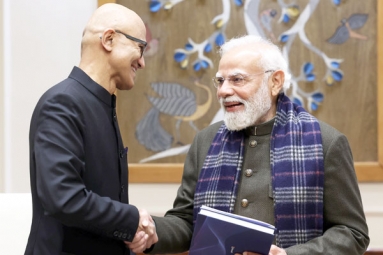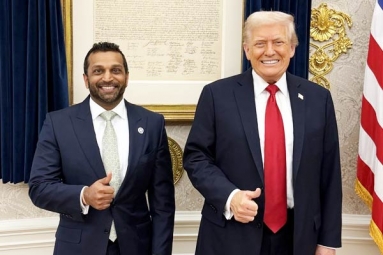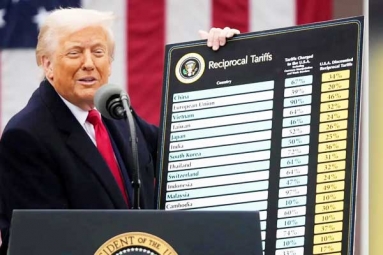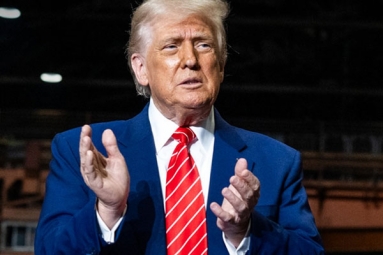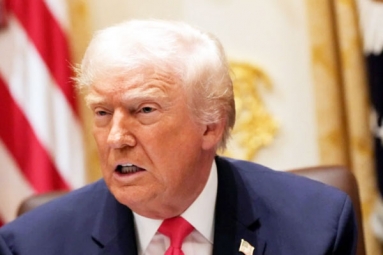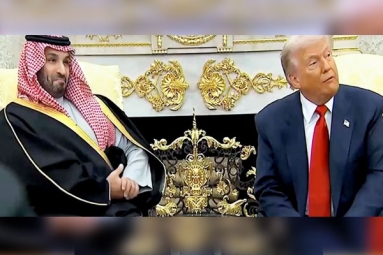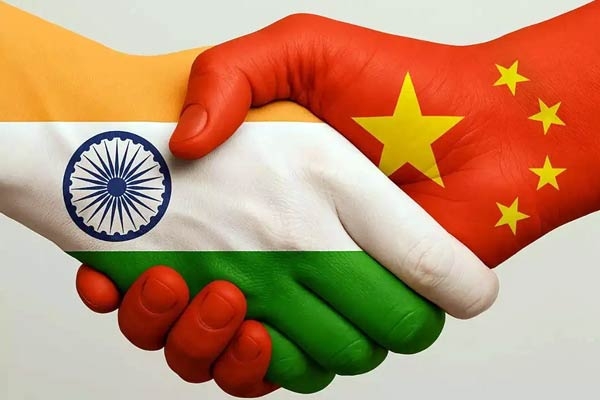
(Image source from: Economictimes.indiatimes.com)
It seems that Donald Trump's tariffs are achieving what years of political negotiations and diplomatic efforts have largely failed to accomplish – facilitating collaboration between India and China. This viewpoint aligns with comments made by Chinese Foreign Minister Wang Yi last month, who referred to the two nations as needing to "make the dragon and elephant dance." The tariffs imposed by the U.S. President on China have skyrocketed to an astonishing 104 percent, following Beijing's reaction to the initial tariffs, which included a 34 percent tax of its own. This has sparked a renewed trade conflict between these economic powerhouses, with China declaring its intent to resist what it labels "American aggression... to the end."
Furthermore, Trump's tariffs and the ensuing high-stakes confrontation with China's Xi Jinping seem to have prompted Beijing to issue several amicable remarks regarding its relationship with New Delhi. On Tuesday, for instance, the Chinese Embassy urged both India and China to "stand together to overcome difficulties." A spokesperson from the embassy, Yu Jing, emphasized the mutual benefits inherent in the economic ties between China and India. She pointed out that in light of the United States' misuse of tariffs, which undermines growth opportunities for countries, particularly those in the "Global South," the major developing nations in the region should unite.
Her message also appeared to serve as a cautionary note for Trump, stating that "trade and tariff wars yield no victors" and urging all nations to honor the principle of comprehensive dialogue, embrace genuine multilateralism, and collectively resist any forms of unilateralism and protectionism. Additionally, the embassy stressed China's significant role in the global economy, asserting that the nation accounts for approximately 30 percent of the world’s annual economic growth. "We will persist in collaborating with the global community to defend the multilateral trading system," Ms. Yu's statement conveyed.
As of now, India has not issued a response to these communications. Ms. Yu's remarks came shortly after President Jinping himself expressed to President Droupadi Murmu in Beijing on April 1 the importance of cooperation between India and China. The fact that these calls for collaboration originate from the highest ranks in Beijing is noteworthy, even if they seem to be a reaction to the barrage of tariffs deployed by the U.S. On Wednesday, Trump followed through on his warning regarding "additional 50 percent tariffs," with the White House confirming that the total tariff rate imposed by Washington, D.C. on Beijing would reach an unprecedented 104 percent.
At present, the economic impact of tariffs on India is less severe compared to that on China. President Trump has consistently remarked that India, specifically Delhi, engages in significant tariff abuses. Nonetheless, a more amicable bond with Prime Minister Narendra Modi seems to be preventing excessively high import tariffs. Recently, Trump revealed "discounted" tariffs for India, which amount to just 26 percent, in addition to a baseline of 10 percent for certain items like steel. There's also a chance that additional levies could be introduced on pharmaceutical imports. In 2024, India's exports to the United States totaled $89.91 billion, but this year certain sectors, including seafood and automotive parts, which have a separate tariff of 25 percent, are expected to suffer losses.
Contrarily, India has declared that it will refrain from imposing retaliatory tariffs, although analysts predict exports to the US could decline by as much as $5.76 billion this year. A government source informed Reuters that India intends to leverage a provision that might offer relief to trading partners who take significant measures to address non-reciprocal trade arrangements. Reports suggest that India is also considering the possibility of reducing its tariffs in specific instances. The relationship between China and India has been strained and often hostile, especially in light of violent incidents in the Galwan Valley of Ladakh in June 2020, which led to an increased military presence along the border. It was only in October of the previous year that an agreement concerning patrols was established.
This agreement seemed to initiate a warming of relations between India and China, highlighted by a meeting between Prime Minister Modi and President Jinping shortly after its announcement, an improvement that appears to extend to economic interactions, aided by the numerous tariffs imposed by Trump. Last month, the Chinese Foreign Minister urged New Delhi and Beijing to collaborate and "lead the way in opposing hegemonism and power politics." He also stated, "Supporting one another instead of undermining each other and enhancing cooperation is in our core interests." Furthermore, he emphasized the significance of the Modi-Jinping meeting, insisting, "We must not allow the boundary issue to define our bilateral relations."





